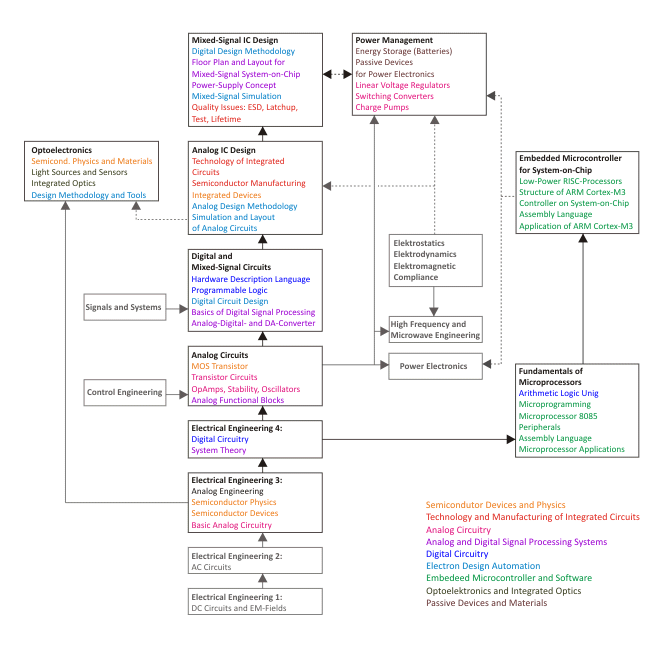Moduls offered and embedding in the course of electrical engineering
The microelectronics department offers a total of 10 modules, which are integrated in the following study courses:
| Elektrotechnik III: Analogtechnik 33202 (ET 3) | Pflicht: BSc IMT; ET Kern: MSc MB; SR; FZ-Antriebe | WiSe | 4 KP V2; Ü2 |
| Elektrotechnik IV: Digitaltechnik und Schaltungssimulation 33201 (ET 4) | Pflicht: BSc ET | SoSe | 4 KP V2; Ü2 |
| Grundlagen der Mikroprozessortechnik 33207 (GMP) | Pflicht: BSc ET; SR; ME+IT Kern: MSc MB; SR; Automatisierungst. | SoSe | 10 KP V2; Ü2; S2; P2 |
| Analoge Schaltungen 33315 (AS) | Kern: MSc ET; SR; ME+IT Wahlpflicht: BSc ET | WiSe | 6 KP V2; Ü2; P2 |
| Digitale und Mixed-Signal Schaltungen 33320 (DMS) | Wahlpflicht: BSc ET Wahlpflicht: MSc ET | SoSe | 6 KP V2; Ü2; P2 |
| Analog IC Design 11359 (AIC) | Kern: MSc ET; SR; ME+IT | WiSe | 6 KP V2; P3 |
| Mixed-Signal IC Design 11360 (MIC) | Kern: MSc ET; SR; ME+IT | SoSe | 6 KP V2; P3 |
| Power Management 11276 (PM) | Wahlpflicht: MSc ET | WiSe (Bei Bedarf) | 6 KP V2; P2 |
| Mikrocontroller für System-on-Chip 33314 (MSC) | Wahlpflicht: BSc ET Wahlpflicht: MSc ET | WiSe (Bei Bedarf | 6 KP V2; P2 |
| Optoelektronik 11358 (OE) | Wahlpflicht: BSc ET Wahlpflicht: MSc ET | WiSe (Bei Bedarf) | 6 KP V2; P2 |
In all other modules, care has been taken to ensure that the content of the courses is particularly perceived by students whose main focus is not on the development of integrated circuits but predominantly on the application of electronic circuits and the use of microcontrollers for systems in industry, automotive and power engineering. For example, the ARM Cortex-M3 controller is also discussed in Embedded Microcontrollers for System-on-Chip, which is mainly used in industrial control technology and for automotive applications. Today, the ARM controller family is used in almost every mobile electronic device (mobile phone, etc. ). The Power Management module addresses the topic of energy storage and conversion for mobile electronic devices. This includes basic knowledge about the function of modern Li-Ion batteries as well as the low-loss conversion of the operating voltages of the system components. The basic knowledge and procedures can also be well transferred to the field of electromobility.
The design of complex integrated circuits requires knowledge of semiconductor devices and semiconductor physics, technology and manufacturing of integrated circuits, analog circuit technology, analog and digital signal processing systems, digital circuit technology, computer-aided design methods, embedded microcontrollers and software, as well as passive devices and materials. The field of optoelectronics and integrated optics is also covered by a lectureship (Dr. Kunkel).
The following diagram illustrates the temporal arrangement of the modules offered by the microelectronics department and briefly names their contents. The colors of the module contents correspond to the mentioned topic fields, which are highlighted in color in the lower right corner of the legend. The diagram also indicates the links with some exemplarily selected modules of other subject areas.

